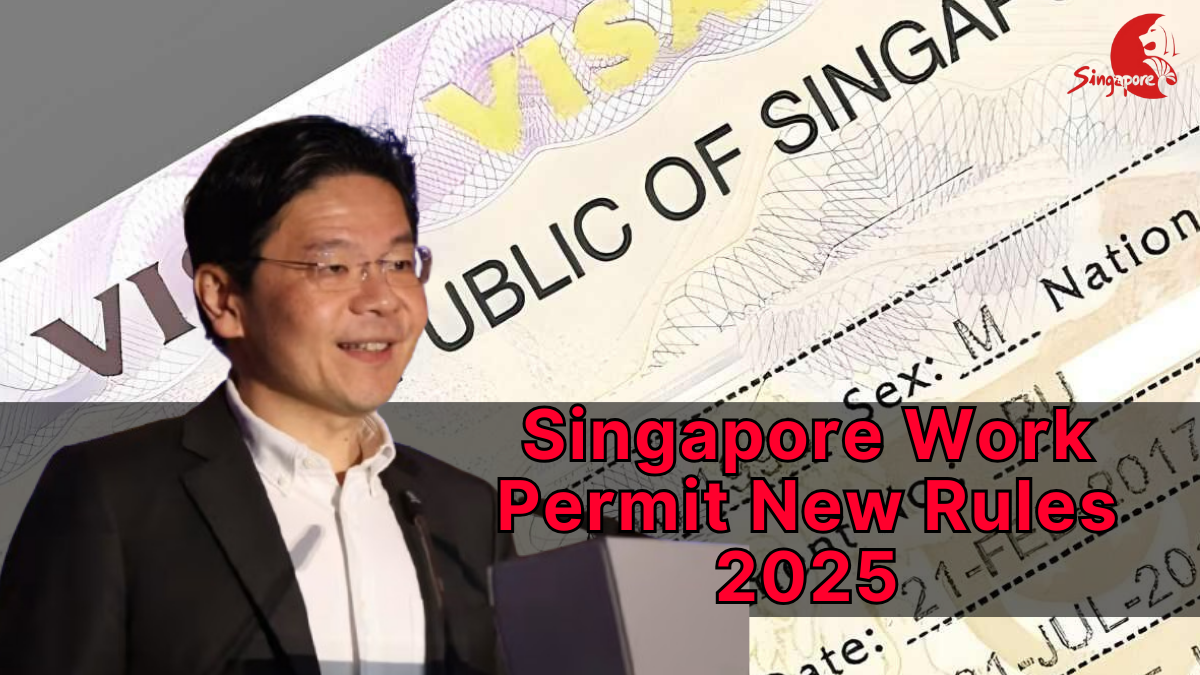From 2025, Singapore’s Ministry of Manpower (MOM) has introduced sweeping changes to the work permit system, aiming to strengthen the quality of its workforce while ensuring that Singaporeans remain the first choice for employment opportunities.

These reforms are part of the government’s strategy to:
- Attract highly skilled talent.
- Reduce dependence on low-wage foreign labor.
- Promote local workforce development through upskilling.
For both employers and foreign job seekers, understanding these changes is essential to remain compliant and competitive.
Why Singapore is Updating Its Work Permit Rules
These reforms align with Singapore’s long-term labor vision:
- A future-ready workforce driven by skill and innovation.
- Fair wages for all workers.
- A balanced local-foreign workforce ratio.
The updates also ensure that foreign hires complement rather than replace local talent.
Quick Summary: Singapore Work Permit New Rule
Aspect |
Previous Policy |
2025 Update |
|---|---|---|
Minimum Salary (Key Sectors) |
Lower thresholds in construction, marine, and manufacturing |
Raised to attract skilled workers and reduce reliance on low-wage labor |
Age Requirement |
No strict upper age limit |
Maximum age capped at 50 |
Educational Qualifications |
Basic or undefined criteria |
Relevant qualifications required |
Employer Justification |
General manpower need |
Must prove active local hiring efforts first |
Application Process |
Slower, more paperwork |
Faster online system with stricter documentation |
Policy Focus |
Broad labor access |
Skilled and productive workforce prioritization |
Official Link |
Higher Minimum Salary for Key Sectors
One of the most significant updates is the increase in salary thresholds for foreign workers in specific industries such as:
- Construction
- Marine
- Manufacturing
Objectives of the Salary Hike:
- Ensure foreign hires are skilled professionals rather than low-cost labor.
- Boost labor productivity.
- Create fairer wage conditions for both locals and foreigners.
By setting higher salary bars, Singapore intends to filter for experience and capability, attracting workers who can contribute meaningfully to sector growth.
New Age Limit and Skills-Based Eligibility
Previously, there was no strict upper age limit for work permit applicants. From 2025:
- Applicants must be under 50 years old.
- Must possess relevant educational qualifications.
- Should have verifiable industry experience or technical skills matching the job role.
This ensures that the workforce remains dynamic, capable, and aligned with industry needs in Singapore’s future economy.
Stricter Employer Requirements
The onus is now on employers to justify foreign hires by:
- Showing evidence of attempts to hire Singaporeans first.
- Implementing training or upskilling programs for locals.
- Providing detailed job descriptions and explaining why foreign expertise is required.
Failure to meet these requirements may result in rejected work permit applications.
Enhanced Application Process
While entry requirements are more stringent, MOM has streamlined the application process to make it faster for legitimate applicants:
- Optimized online submission portal.
- Shorter processing times for complete applications.
- Stricter review for incomplete or non-compliant submissions, which may face delays or rejections.
This approach rewards prepared and compliant employers while discouraging unsubstantiated applications.
Implications for Employers
Employers in industries heavily reliant on foreign labor must now:
- Reassess job requirements to match the higher criteria.
- Document recruitment efforts for Singaporeans before applying for foreign hires.
- Invest in local talent development to reduce dependency on work permit holders.
Non-compliance risks include delays, rejections, or loss of eligibility to hire foreign workers.
Implications for Foreign Job Seekers
Foreign professionals aiming to work in Singapore must:
- Update qualifications to meet sector-specific requirements.
- Gather comprehensive employment records to prove relevant experience.
- Prepare for a more competitive selection process.
However, skilled candidates with in-demand certifications or niche expertise may benefit from quicker approvals and better job opportunities.
Preparing for the Changes-Employers and Workers
Both companies and workers must adapt now to avoid disruptions:
For Employers:
- Audit current foreign workforce against new rules.
- Upgrade internal hiring processes to meet MOM standards.
- Build local talent pipelines.
For Workers:
- Acquire additional certifications where possible.
- Stay informed about sector-specific salary thresholds.
- Use verified channels and official resources for application guidance.
Frequently Asked Questions (FAQs)
Q1: Who will be most affected by the 2025 work permit changes?
A: Foreign workers in construction, marine, and manufacturing will be most affected due to higher salary and qualification requirements.
Q2: Is there now an age limit for applicants?
A: Yes, new applicants must be under 50 years old.
Q3: How has the application process changed?
A: The process is now faster and fully online, but with stricter documentation and qualification requirements.
Q4: Do employers still need to justify foreign hires?
A: Yes. Employers must prove they attempted to hire locals and provide valid reasons for hiring foreign talent.
Q5: Where can I get the official guidelines?
A: Visit the Ministry of Manpower – Singapore for detailed rules and updates.
Conclusion
Singapore’s 2025 work permit updates mark a clear shift toward a more skilled, fairly paid, and locally supported workforce. The higher salary thresholds, capped age limits, skills-based eligibility, and tougher employer requirements underscore the country’s commitment to economic resilience and workforce quality.
For employers, the message is clear: prioritize local hiring, document your efforts, and ensure foreign hires meet the higher bar. For workers, the focus should be on upgrading skills and maintaining competitive credentials.
With preparation, both sides can navigate the transition successfully and continue contributing to Singapore’s dynamic economy.
For More Information Click Here